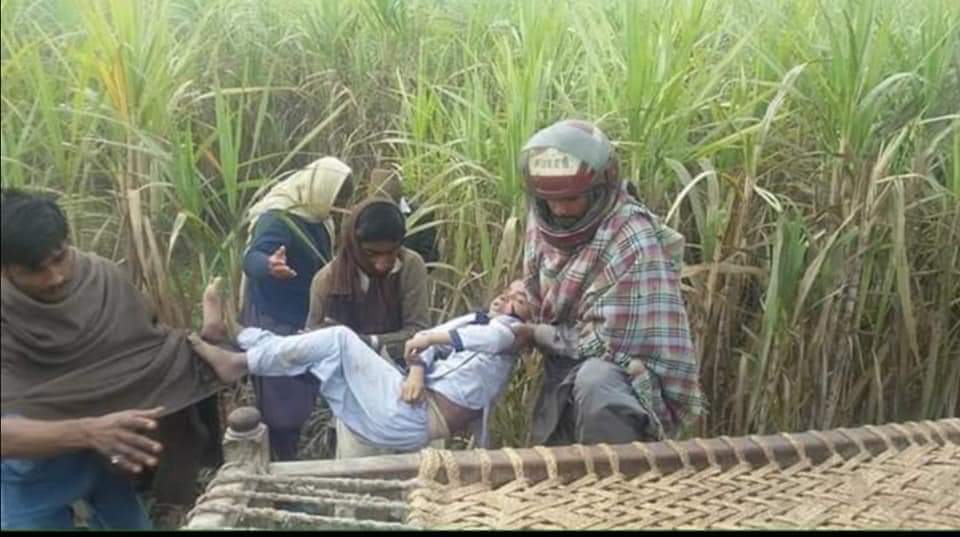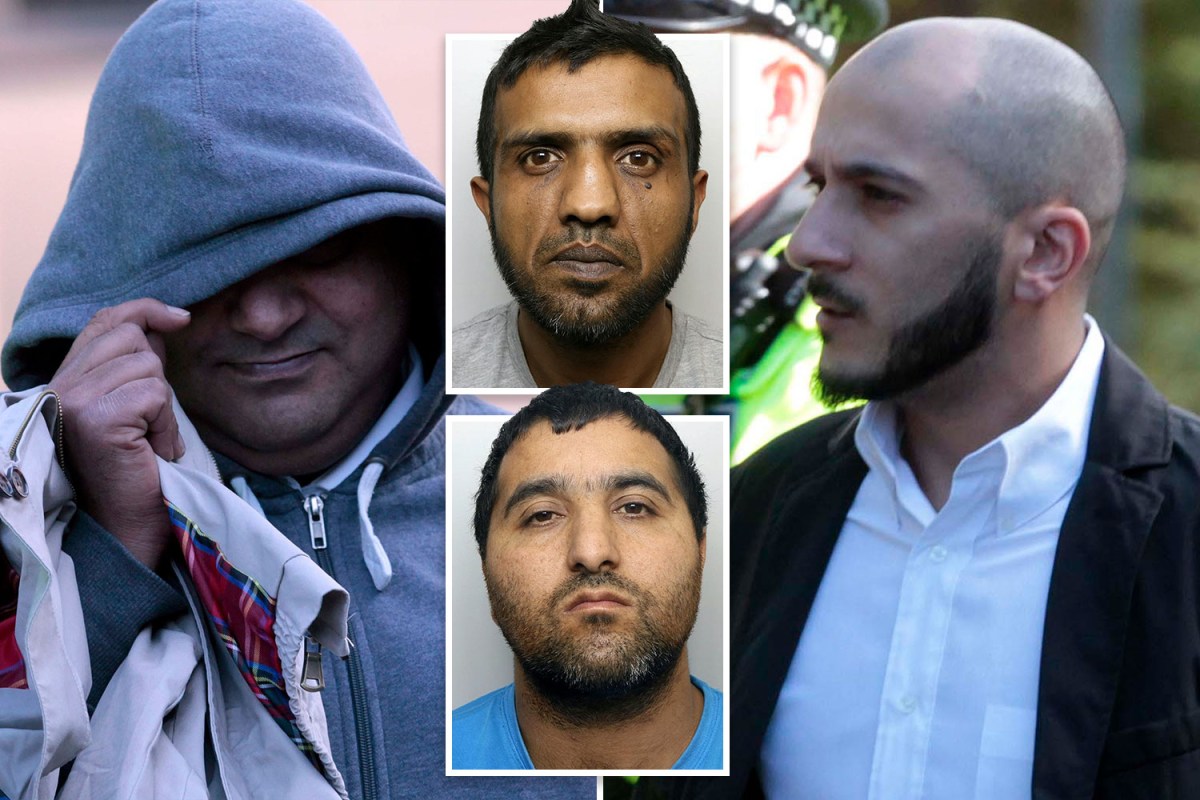- Joined
- Sep 22, 2012
- Messages
- 3,326
- Likes
- 5,407
358 child abuse cases reported in last five years across Sindh
KARACHI: As many as 358 children — 252 boys and 106 girls — became victims of child abuse in Sindh between 2014 and 2019, it emerged on Sunday.
A recent police study about child abuse cases in the province showed that girls found to be more vulnerable between ages of 1-5 and 16-18 while boys found to be more vulnerable between ages of 6-10 and 11-15.
It said that the police registered total 349 cases and arrested 408 suspects across the province during the five-year period.
The police presented charge sheets of 257 cases before the courts concerned, 70 cases were cancelled while 17 cases remained untraced. Out of 257 cases referred to the courts, 17 cases ended up in conviction compared to 132 cases in which accused earned acquittal. Around 117 cases were still pending for trial, the study said.
Around 96 boys and 20 girls have fallen prey to abusers in Karachi alone
Most cases reported in Karachi
According to figures, total 116 children became victims of abuse in Karachi from year 2014 to 2019. Out of them, 96 were boys and 20 were girls.
The police arrested 86 suspects, presented charge sheets of 68 cases, cancelled 28 and showed 16 untraced in the provincial capital. The courts awarded punishments in three cases and acquittals in nine cases. At present, 56 cases were pending trial.
In Thatta district, 26 children, including 17 boys, became victims of child abuse. The police arrested 38 suspects, presented challans of all 26 cases. The courts awarded conviction in two cases, granted acquittals in 17 cases while seven cases were still pending trial.
In Tando Mohammed Khan district, total 23 children, including 16 boys, fell victims to child abuse. The police arrested 38 suspects, presented challans of 18 suspects in courts and cancelled two cases. The courts convicted suspects in four cases and acquitted in eight cases. Six cases were pending trial.
In Tando Allahyar district, 15 children, including six girls, became victims of child abuse. The police arrested 22 suspects, presented challans of nine cases while cancelled six cases. The court awarded punishment in one case while passed acquittal orders in five cases. Three cases were still pending for trial.
In Dadu district, 36 children, including 28 boys, were abused. The police arrested 51 suspects, presented challans of 25 cases while one case was cancelled. The courts convicted accused in three cases while acquitted those in 15 cases. Seven cases were pending trial in the said district.
In Matiari district, 37 children, including 27 boys, were abused. The police arrested 48 cases, presented challans of 33 cases while five cases were cancelled. The courts granted convictions in two cases and acquittals in 27 cases while four cases were pending trial.
In Shaheed Benazirabad district, total 53 children, including 34 boys, became victims of child abuse. The police arrested 63 suspects, presented challans of 47 cases and cancelled one case. The courts awarded punishment in two cases and acquitted accused in 27 cases while 20 cases were pending for trial.
In Jacobabad district, total 24 children, including 12 girls, became victims of abuse. The police arrested 25 suspects, presented challans of 14 cases while three cases were cancelled. One case remained untraced. The courts acquitted accused in 12 cases. No one was convicted while six cases were pending trial.
In Larkana district, 14 children, including nine boys, were abused. The police arrested 13 suspects, presented challans of seven cases and cancelled five cases. No one was convicted and the courts acquitted accused in five cases. Two cases were pending trial.
In Naushahro Feroze district, total 14 children, including 10 girls, became victims of child abuse. The police arrested 24 suspects, presented challans of 10 cases and cancelled one case. No conviction was granted and the courts acquitted accused in seven cases while six cases were pending trial.
Concerns over rising incidents
The police study also did a comparative analysis of child abuses with other three provinces, which revealed that the most child abuse cases were reported in Punjab followed by Sindh and Khyber Pakhtunkhwa.
Referring to various child abuse cases in Punjab, the police study noted with concern that such cases were increasing in Sindh.
It pointed out two cases in Naushahro Feroze district, which had been declared as “utterly unbelievable and extremely reprehensible”.
In one case, a man confessed that he had been raping her two daughters for nearly a year. The police took action against him when the victims approached the police and filed a written complaint against him.
As nobody believed their ordeal, the victims managed to film a video of their father, which later on was submitted to the police for further investigation.
In another such case in the same area, a paternal uncle was alleged to have broken into a house and sexually assaulted his minor niece. Later the mother singlehandedly protested and demanded the justice.
Call to spread awareness among children
Citing several research studies carried out in the country and abroad, the police study said there were adverse consequences of child abuse ranging from social, emotional, cognitive, educational problems, to low self-esteem and self-harm or sometimes it may lead to suicide.
There were also links between physical abuse, depression, and aggressive behaviours.
“It appears that males and females react differently to trauma, with males engaging in more antisocial behaviours and females becoming more withdrawn.”
Other long-term effects included criminal risk taking behaviours and drug and alcohol problems.
Several recommendations have been made to control child abuse cases such as blocking porn websites, stamping out drug mafias and creating awareness among young children about child abuse at schools.
It also called for adopting child protection policies.
Published in Dawn, March 16th, 2020
https://www.dawn.com/news/1541169/358-child-abuse-cases-reported-in-last-five-years-across-sindh
KARACHI: As many as 358 children — 252 boys and 106 girls — became victims of child abuse in Sindh between 2014 and 2019, it emerged on Sunday.
A recent police study about child abuse cases in the province showed that girls found to be more vulnerable between ages of 1-5 and 16-18 while boys found to be more vulnerable between ages of 6-10 and 11-15.
It said that the police registered total 349 cases and arrested 408 suspects across the province during the five-year period.
The police presented charge sheets of 257 cases before the courts concerned, 70 cases were cancelled while 17 cases remained untraced. Out of 257 cases referred to the courts, 17 cases ended up in conviction compared to 132 cases in which accused earned acquittal. Around 117 cases were still pending for trial, the study said.
Around 96 boys and 20 girls have fallen prey to abusers in Karachi alone
Most cases reported in Karachi
According to figures, total 116 children became victims of abuse in Karachi from year 2014 to 2019. Out of them, 96 were boys and 20 were girls.
The police arrested 86 suspects, presented charge sheets of 68 cases, cancelled 28 and showed 16 untraced in the provincial capital. The courts awarded punishments in three cases and acquittals in nine cases. At present, 56 cases were pending trial.
In Thatta district, 26 children, including 17 boys, became victims of child abuse. The police arrested 38 suspects, presented challans of all 26 cases. The courts awarded conviction in two cases, granted acquittals in 17 cases while seven cases were still pending trial.
In Tando Mohammed Khan district, total 23 children, including 16 boys, fell victims to child abuse. The police arrested 38 suspects, presented challans of 18 suspects in courts and cancelled two cases. The courts convicted suspects in four cases and acquitted in eight cases. Six cases were pending trial.
In Tando Allahyar district, 15 children, including six girls, became victims of child abuse. The police arrested 22 suspects, presented challans of nine cases while cancelled six cases. The court awarded punishment in one case while passed acquittal orders in five cases. Three cases were still pending for trial.
In Dadu district, 36 children, including 28 boys, were abused. The police arrested 51 suspects, presented challans of 25 cases while one case was cancelled. The courts convicted accused in three cases while acquitted those in 15 cases. Seven cases were pending trial in the said district.
In Matiari district, 37 children, including 27 boys, were abused. The police arrested 48 cases, presented challans of 33 cases while five cases were cancelled. The courts granted convictions in two cases and acquittals in 27 cases while four cases were pending trial.
In Shaheed Benazirabad district, total 53 children, including 34 boys, became victims of child abuse. The police arrested 63 suspects, presented challans of 47 cases and cancelled one case. The courts awarded punishment in two cases and acquitted accused in 27 cases while 20 cases were pending for trial.
In Jacobabad district, total 24 children, including 12 girls, became victims of abuse. The police arrested 25 suspects, presented challans of 14 cases while three cases were cancelled. One case remained untraced. The courts acquitted accused in 12 cases. No one was convicted while six cases were pending trial.
In Larkana district, 14 children, including nine boys, were abused. The police arrested 13 suspects, presented challans of seven cases and cancelled five cases. No one was convicted and the courts acquitted accused in five cases. Two cases were pending trial.
In Naushahro Feroze district, total 14 children, including 10 girls, became victims of child abuse. The police arrested 24 suspects, presented challans of 10 cases and cancelled one case. No conviction was granted and the courts acquitted accused in seven cases while six cases were pending trial.
Concerns over rising incidents
The police study also did a comparative analysis of child abuses with other three provinces, which revealed that the most child abuse cases were reported in Punjab followed by Sindh and Khyber Pakhtunkhwa.
Referring to various child abuse cases in Punjab, the police study noted with concern that such cases were increasing in Sindh.
It pointed out two cases in Naushahro Feroze district, which had been declared as “utterly unbelievable and extremely reprehensible”.
In one case, a man confessed that he had been raping her two daughters for nearly a year. The police took action against him when the victims approached the police and filed a written complaint against him.
As nobody believed their ordeal, the victims managed to film a video of their father, which later on was submitted to the police for further investigation.
In another such case in the same area, a paternal uncle was alleged to have broken into a house and sexually assaulted his minor niece. Later the mother singlehandedly protested and demanded the justice.
Call to spread awareness among children
Citing several research studies carried out in the country and abroad, the police study said there were adverse consequences of child abuse ranging from social, emotional, cognitive, educational problems, to low self-esteem and self-harm or sometimes it may lead to suicide.
There were also links between physical abuse, depression, and aggressive behaviours.
“It appears that males and females react differently to trauma, with males engaging in more antisocial behaviours and females becoming more withdrawn.”
Other long-term effects included criminal risk taking behaviours and drug and alcohol problems.
Several recommendations have been made to control child abuse cases such as blocking porn websites, stamping out drug mafias and creating awareness among young children about child abuse at schools.
It also called for adopting child protection policies.
Published in Dawn, March 16th, 2020
https://www.dawn.com/news/1541169/358-child-abuse-cases-reported-in-last-five-years-across-sindh











